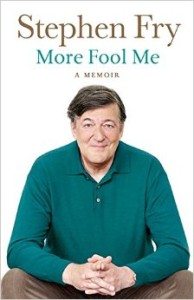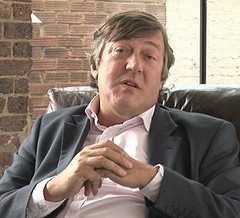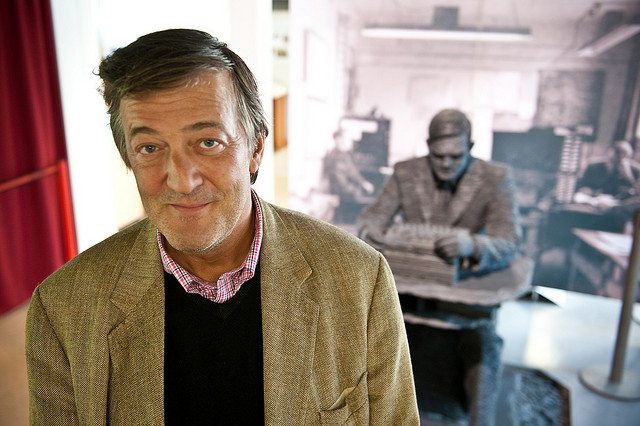Review: More Fool Me by Stephen Fry
[dropcap]M[/dropcap]ore Fool Me is Stephen Fry’s third memoir, which in itself is evidence of a life lived. Fry, it seems, has been and done everything: novelist, comedian, actor, director, presenter, and public spokesperson of, among other things, mental  illness, atheism and same-sex love. His new memoir, while peppered with names and faces from the world of comedy, is dominated by the darker themes of drugs, depression and dependency. Cocaine was his substance of choice, and whatever effect it may have had on his mind, it has clearly done nothing to curb Fry’s searing honesty.
illness, atheism and same-sex love. His new memoir, while peppered with names and faces from the world of comedy, is dominated by the darker themes of drugs, depression and dependency. Cocaine was his substance of choice, and whatever effect it may have had on his mind, it has clearly done nothing to curb Fry’s searing honesty.
His two previous memoirs, Moab Is My Washpot and The Fry Chronicles, document his life up until the late 1980’s. Readers already familiar with these earlier works will find his opening chapter, a recap of these early years, a little tiring. In Moab, he tells of a young boy ashamed of his sexuality and thrilled by petty theft. We learn of the enrolments and expulsions from expensive boarding schools, and about how an anxious teenager who idolised Oscar Wilde and was in the throes of first (and unrequited) love ended up in prison for credit card fraud.
The Chronicles saw a change in tone, as this same boy earned a scholarship to Cambridge and met such later friends as Hugh Laurie and Emma Thompson. His trials and tribulations were all told with the benefit of his later diagnosis of manic-depression, and his early emotional peaks and troughs were examined through that lens. I can’t resist quoting Fry’s attempt to describe bipolar disorder:
“The nature of depression, mania’s sinister twin, is that it is opposite in every regard. The one gives you hope and a vainglorious, grandiose belief in the future; the other convinces you of life’s entire and eternal futility. The one gives an urge to communicate by text, letter, phone call, Twitter and personal visit. The other casts one alone into a darkened room, refusing visitors and rolling away to turn one’s back on those poor concerned ones who love you and want to speak to you. Two poles.”
I was recently knocked sideways by the revelation that Fry attempted suicide in 2012, and am grateful that he does not sidestep the issue of his mental well-being. He does not speculate too much about the relation between his condition and his tendency to addiction, preferring to describe in detail his first snort of a line with an unnamed actor. The number of times Fry conceals the name of an individual is both irritating and tantalising. Presumably we would recognise a good few of them.
His social life during the years depicted was epic
Fry might be one of the few people who can claim to have snorted cocaine in, among other places, the Houses of Commons and Buckingham Palace. One of his favourite watering holes, the Groucho Club in Soho, features heavily. Readers are rewarded with, among other anecdotes, a hilarious story connecting Al Pacino to a tramp. My favourite part of the book describes the time Fry was exhilaratingly close to being caught and prosecuted for possession. Picture this: he was picked up for driving under the influence of alcohol and driven to the police station, with three grams of cocaine in his pocket and the knowledge that he would surely be searched at the station. I leave it to you all to read what happens next, except to mention that a condom case is an important prop.
Swiftly changing the subject, homosexuality was not legalised in the UK until 1967, around the time that Fry ‘knew’ he was not ‘as other men’. One of the joys of his previous memoirs was his descriptions of how reading Wilde and absorbing the melodies of Tchaikovsky helped alleviate his sense of shame, and the few references to his love life in this book, in contrast to the other memoirs, will be disappointing to those of us who love the salacious details. There is, however, an extremely poignant reminder of the ravages of AIDs, and Fry is among those who are keen for this particular nightmare not to be forgotten.

More Fool Me is not without its problems. About a third of it is composed of his diary entries from the time, and while these are illuminating it does feel like Fry is cheating a little bit. An over generous array of photographs makes me suspect that the book has been rushed a little. Also, while I happen to love Fry’s prose, it is definitely open to the charge of being too verbose, if not bloated at times. But I can forgive him all of this and more as his love of the written word is evident on every page.
I’m unsure what to think about the supposed link between comedy and depression, but Stephen Fry’s life story at least encourages the connection to be made. Fry knows all too well what it is like to have a dark night of the soul, and this new book is a wonderful case-study of the tempting but clichéd lengths people go to in order to keep them at bay. It is a testament to his strength of character that he has battled on, in spite of his inner demons, and moulded a life devoted to the twin peaks of language and laughter.
Image Credits: Header (Flickr/Christian Payne), Image 1 (amazon.co.uk), Image 2 (Flickr/Duncan Hall).

Comments